-
01-01-2017
Pelvic floor rehabilitation program: report of 10 years of experience
Revista Brasileira de Enfermagem. 2017;70(1):231-235
Abstract
Pelvic floor rehabilitation program: report of 10 years of experience
Revista Brasileira de Enfermagem. 2017;70(1):231-235
DOI 10.1590/0034-7167-2016-0257
Views0See moreABSTRACT
Objective:
to relate the creation, experience of establishment and service performed in the Pelvic Floor Rehabilitation Program [(PRAP)], a project of the School of Nursing of University of Campinas (UNICAMP), developed at a health unity in Campinas, São Paulo, Brazil.
Results:
this Program appeared due to the high demand of patients with urinary incontinence (UI) and need of formation or qualification of professionals to serve those customers and multiply the actions at other health unities. Nowadays, the PRAP is in its tenth year, and it has served 102 patients with UI and other dysfunctions of the pelvic floor and lower urinary tract, qualified 480 health professionals and stimulated researches.
Conclusion:
the preventive actions of pelvic floor rehabilitation are important areas of the nurse’s performance and initiatives as the related ones contribute for the professional formation and practice based on evidences.
-
01-01-2017
Nursing process in mental health: an integrative literature review
Revista Brasileira de Enfermagem. 2017;70(1):220-230
Abstract
Nursing process in mental health: an integrative literature review
Revista Brasileira de Enfermagem. 2017;70(1):220-230
DOI 10.1590/0034-7167-2016-0031
Views0See moreABSTRACT
Objective:
to identify evidences from the literature on the application of nursing process in care developed by the nurse in mental health.
Method:
integrative literature review between 1990 and 2013, in the PubMed, Scopus, CINAHL and LILCACS bases. Descriptors: nursing processes, mental health, nursing care.
Results:
19 papers were identified. Limited and partial usage of the nursing process in care established by a therapeutic relationship that respects the patient’s individuality. We observe care proposals systematized for patients that present pathological aspects in the limits between the physical and psychical, which might be a response to the influence of the practice based on evidences.
Conclusion:
it was found an antagonistic movement between care based on the relationship and located in the standardization of diagnoses that respond to physical malaise. A lack of evidence was verified for the usage of the nursing process in mental health, and we point at the necessity for the creation of new possibilities for dialogue between relational and biological perspectives.
-
01-01-2017
Nursing practice in home care: an integrative literature review
Revista Brasileira de Enfermagem. 2017;70(1):210-219
Abstract
Nursing practice in home care: an integrative literature review
Revista Brasileira de Enfermagem. 2017;70(1):210-219
DOI 10.1590/0034-7167-2016-0214
Views0See moreABSTRACT
Objective:
analyze scientific production on nursing practice in home care.
Method:
integrative review employing databases LILACS, BDENF, IBECS, and MEDLINE. Studies in Spanish, English, and Portuguese were included, regardless of publishing date.
Results:
after analyzing 48 articles, it was found that nursing practice in home care is complex, employing a multitude of actions by using three technologies: soft; soft-hard especially; and hard. Challenges related to the home-care training process are reported in the literature. Nurses use knowledge from their experience and scientific recommendations in conjunction with their reflections on the practice.
Conclusion:
home nursing practice is fundamental and widespread. Relational and educational actions stand out as necessary even in technical care, with a predominant need for home-care training.

-
01-01-2017
Nonpharmacological interventions to improve quality of life in heart failure: an integrative review
Revista Brasileira de Enfermagem. 2017;70(1):198-209
Abstract
Nonpharmacological interventions to improve quality of life in heart failure: an integrative review
Revista Brasileira de Enfermagem. 2017;70(1):198-209
DOI 10.1590/0034-7167-2016-0112
Views0See moreABSTRACT
Objective:
to identify articles that assessed the effectiveness or efficacy of nonpharmacological interventions to improve quality of life of people with heart failure in the literature.
Method:
an integrative literature review was performed in Lilacs, MedLine and SciELO databases, including randomized or nonrandomized clinical trials and quasi-experimental studies published between 2003 and 2014, in Portuguese, English or Spanish.
Results:
twenty-three studies were included. The categories of nonpharmacological interventions that improved quality of life of people with heart failure were: Remote health monitoring, Instructions on health practices, Physical activity follow-up and Traditional Chinese Medicine practices.
Conclusion:
these results can guide the selection of interventions to be implemented by health professionals that treat people with heart failure. Future systematic reviews with meta-analyses are needed in order to identify the most effective interventions for improving these individuals’ quality of life.

-
01-01-2017
Quality of working life: assessment of intervention studies
Revista Brasileira de Enfermagem. 2017;70(1):189-197
Abstract
Quality of working life: assessment of intervention studies
Revista Brasileira de Enfermagem. 2017;70(1):189-197
DOI 10.1590/0034-7167-2015-0069
Views0See moreABSTRACT
Objective:
to analyze the production of knowledge about interventions on quality of working life.
Method:
integrative review study. The following databases were used for study selection: SciELO, Medline and PubMed.
Results:
the sample included 25 national and international articles that described programs and methods to acquire healthy habits at the workplace and attenuate its mental demands.
Conclusion:
by observing the number of businesses throughout the world, a low number of programs addressing workers’ health and well-being can be found, and the establishment of efficient policies at institutions could improve this situation.

-
REVIEW01-01-2017
Health literacy for people living with HIV/Aids: an integrative review
Revista Brasileira de Enfermagem. 2017;70(1):180-188
Abstract
REVIEWHealth literacy for people living with HIV/Aids: an integrative review
Revista Brasileira de Enfermagem. 2017;70(1):180-188
DOI 10.1590/0034-7167-2015-0052
Views0See moreABSTRACT
Objective:
to analyze knowledge produced by research about health literacy for adult with HIV/Aids.
Method:
an integrative literature review, using six databases, was conducted between January and April of 2014. The descriptors aids and Health Literacy were used, in Portuguese, English and Spanish. A total of 130 articles were found and 14 were selected. Three categories were identified: educational technologies and health literacy for HIV/Aids; assessment of health literacy of patients with HIV/Aids; and health literacy and adherence to antiretroviral therapy.
Results:
analysis of health literacy, socioeconomic status and educational level of people living with HIV/ Aids was essential for implementation of educational strategies that increased adherence to health guidance.
Conclusion:
this study showed the importance of health literacy for working with people living with HIV/Aids, especially considering individuals who did not possess the minimum necessary for survival, which makes it relevant and encourages further research on the topic.

-
01-01-2017
Letramento em saúde para pessoas com HIV/Aids: revisão integrativa
Revista Brasileira de Enfermagem. 2017;70(1):180-188
Abstract
Letramento em saúde para pessoas com HIV/Aids: revisão integrativa
Revista Brasileira de Enfermagem. 2017;70(1):180-188
DOI 10.1590/0034-7167-2015-0052
Views1See moreRESUMEN
Objetivo:
analizar el conocimiento producido por la investigación sobre la salud de alfabetización para adultos con VIH/SIDA.
Método:
una revisión integradora de la literatura, con seis bases de datos, se llevó a cabo entre enero y abril de 2014. Los descriptores SIDA y Educación de la Salud se utilizaron, en portugués, inglés y español. Se encontró un total de 130 artículos y se seleccionaron 14. Se identificaron tres categorías: tecnologías de la educación y alfabetización de la salud para el VIH/SIDA; evaluación de conocimientos sobre la salud de los pacientes con VIH/SIDA; y conocimientos sobre la salud y la adherencia a la terapia antirretroviral.
Resultados:
análisis de los conocimientos sobre la salud, el estatus socioeconómico y nivel educativo de las personas que viven con el VIH / SIDA era esencial para la implementación de estrategias educativas que el aumento de la adherencia a la orientación de la salud.
Conclusión:
Este estudio demostró la importancia de la alfabetización en salud para trabajar con personas que viven con el VIH / SIDA, especialmente teniendo en cuenta a las personas que no poseen el mínimo necesario para la supervivencia, lo que hace que sea aún más relevante y alienta la investigación sobre el tema.
-
01-01-2017
Factors that interfere with the response of nurses in the monitoring of clinical alarms
Revista Brasileira de Enfermagem. 2017;70(1):172-179
Abstract
Factors that interfere with the response of nurses in the monitoring of clinical alarms
Revista Brasileira de Enfermagem. 2017;70(1):172-179
DOI 10.1590/0034-7167-2015-0092
Views0See moreABSTRACT
Objective:
The objective of the present study was to identify and synthesize the best empirical evidence found on factors that influence the response of nurses regarding clinical alarms.
Method:
An integrative literature review was conducted with searches undertaken in ten electronic databases restricted to the period from 2005 to 2016.
Results:
Eight articles were included by cross-checking the descriptors selected.
Conclusion:
In the analysis of the studies, the following possible factors that might interfere with the response of nurses in the monitoring of clinical alarms were found: high number of false alarms, inaudibility of alarms due to the competition of sounds, difficulty in distinguishing the urgency of alarms, and increase in noise caused by the raise in the number of alarms.
-
ORIGINAL ARTICLE07-08-2020
No to distance education! Production of meaning of discourses of nursing representative entities
Revista Brasileira de Enfermagem. 2020;73(5):e20190465
Abstract
ORIGINAL ARTICLENo to distance education! Production of meaning of discourses of nursing representative entities
Revista Brasileira de Enfermagem. 2020;73(5):e20190465
DOI 10.1590/0034-7167-2019-0465
Views0See moreABSTRACT
Objectives:
to analyze the processes of production of meanings, based on the positions of Brazilian nursing representative entities, on distance education, considering the implications for nursing as a discipline, profession and work.
Methods:
this documentary research was carried out in sources from the Federal Nursing Council and Associação Brasileira de Enfermagem, from 2015 to 2018. Data were examined from discourse analysis, using paraphrase and polysemy as analytical devices.
Results:
they were organized based on the effects of meanings produced and affiliated to two analytical categories: “Forms of mobilization and operating entities” and “Basis and justifications for the positions”.
Final Considerations:
the discourses signal concern about the future training of new professionals. Resistance, participation, visibility, broad and emphatic debate on the topic are shown as strategies for coping and defending a training process less captured by neoliberal logic, and more relational and committed to the quality of health care.

-
ORIGINAL ARTICLE07-13-2020
Culture of patient safety in hospital units of gynecology and obstetrics: a cross-sectional study
Revista Brasileira de Enfermagem. 2020;73(5):e20190576
Abstract
ORIGINAL ARTICLECulture of patient safety in hospital units of gynecology and obstetrics: a cross-sectional study
Revista Brasileira de Enfermagem. 2020;73(5):e20190576
DOI 10.1590/0034-7167-2019-0576
Views0See moreABSTRACT
Objectives:
to assess the patient safety culture of the health team working in three maternity hospitals.
Methods:
observational, cross-sectional, comparative study. 301 professionals participated in the study. The Hospital Survey on Patient Safety Culture questionnaire validated in Brazil was used. For data analysis, it was considered a strong area in the patient safety culture when positive responses reached over 75%; and areas that need improvement when positive responses have reached less than 50%. To compare the results, standard deviation and thumb rule were used.
Results:
of the 12 dimensions of patient safety culture, none obtained a score above 75%, with nine dimensions scoring between 19% and 43% and three dimensions between 55% and 57%.
Conclusions:
no strong dimensions for safety culture were identified in the three maternity hospitals. It is believed that these results may contribute to the development of policies that promote a culture of safety in institutions.
-
REVIEW07-13-2020
The quality of life of family health professionals: a systematic review and meta-synthesis
Revista Brasileira de Enfermagem. 2020;73(5):e20190645
Abstract
REVIEWThe quality of life of family health professionals: a systematic review and meta-synthesis
Revista Brasileira de Enfermagem. 2020;73(5):e20190645
DOI 10.1590/0034-7167-2019-0645
Views1See moreABSTRACT
Objectives:
to perform a systematic review and meta-synthesis of qualitative studies about the work-related quality of life of Family Health Strategy professionals.
Methods:
this systematic review was developed to answer the following PVO question: “Which factors (variables) are associated with the work-related quality of life (outcome) of Family Health Strategy professionals (population)?” The PubMed, Scopus, Embase, SciELO, Web of Science, LILACS, Science Direct, OpenThesis, OpenGrey, and OATD databases were selected. The meta-synthesis analyzed the main codes and secondary codes of all included studies.
Results:
the database search resulted in 1,744 reports; six were considered eligible for the meta-synthesis. Four factors were considered for the quality of work life: working conditions; work processes; interpersonal relationships; and personal aspects.
Conclusions:
although this study confirms the adequacy of aspects commonly related to the quality of work life, other factors are important in the case of FHS professionals, especially work context.

-
LETTER TO THE EDITOR07-01-2020
Letter to the Editor: doubts and considerations about Coronary Syndrome
Revista Brasileira de Enfermagem. 2020;73(5):e2020730502c
Abstract
LETTER TO THE EDITORLetter to the Editor: doubts and considerations about Coronary Syndrome
Revista Brasileira de Enfermagem. 2020;73(5):e2020730502c
DOI 10.1590/0034-7167.2020730502c
Views0Dear Editor,We wrote this letter referring to the article “Impact of anxiety and depression on morbidity and mortality of patients with coronary syndrome”() to make some comments, in order to clarify doubts that we were missing from answering. We have already made it clear that our intention is not to question the work of the […]See more -
ORIGINAL ARTICLE08-10-2020
Workers’ Health in Brazil: Accidents recorded by Social Security from 2008 to 2014
Revista Brasileira de Enfermagem. 2020;73(6):e20180892
Abstract
ORIGINAL ARTICLEWorkers’ Health in Brazil: Accidents recorded by Social Security from 2008 to 2014
Revista Brasileira de Enfermagem. 2020;73(6):e20180892
DOI 10.1590/0034-7167-2018-0892
Views0See moreABSTRACT
Objectives:
to analyze the incidence of occupational accidents in Brazil, recorded by Social Security according to the geographic regions, age group, gender and their prevalence according to the causes and branch of economic activity.
Methods:
ecological descriptive study with time series analysis from 2008 to 2014. Data on the beginning and end of the historical series were compared in each ecological unit studied.
Results:
the South and Southeast regions, male, between 20 and 49 years of age presented the highest falls in incidence. 70.87% of the causes occurred in group XIX of ICD-10. The economic activity with the highest prevalence of accidents was the manufacturing industry.
Conclusions:
accidents at work have decreased in Brazil, however, the incidence is still high. Advances need to be made in the recording of accidents and in the prevention and surveillance of workers’ health.
-
ORIGINAL ARTICLE08-10-2020
Neonatal near miss in the intensive care unit
Revista Brasileira de Enfermagem. 2020;73(6):e20180931
Abstract
ORIGINAL ARTICLENeonatal near miss in the intensive care unit
Revista Brasileira de Enfermagem. 2020;73(6):e20180931
DOI 10.1590/0034-7167-2018-0931
Views0See moreABSTRACT
Objective:
To analyze near miss cases among newborns hospitalized in the Intensive Care Unit.
Methods:
An observational, cross-sectional, retrospective study using the STROBE guideline. Data were collected from 1,101 records of live births (newborns). Statistical analysis used the Epi-Info program 3.3.2 and Chi-square and Fisher’s exact tests.
Results:
A total of 162 newborns were hospitalized, of which 63 had at least one criterion of near miss. The variables that remained associated with neonatal near miss were weight <1.750 g, gestational age <33 weeks and Apgar at 5 minutes <7, pragmatic criteria to identify cases of neonatal near miss morbidity.
Conclusion:
Prematurity and low birth weight were the factors that contributed most to the near miss outcome among newborns hospitalized in intensive care, a rate two and a half times higher than the number of deaths, according to scientific evidence.

-
08-10-2020
Care for the critical patient undergoing point-of-care testing: integrative review
Revista Brasileira de Enfermagem. 2020;73(6):e20180948
Abstract
Care for the critical patient undergoing point-of-care testing: integrative review
Revista Brasileira de Enfermagem. 2020;73(6):e20180948
DOI 10.1590/0034-7167-2018-0948
Views0See moreABSTRACT
Objective:
to identify, based on the evidence, point-of-care testing in bedbound in critically ill patients.
Method:
integrative review, carried out through search in Pubmed, Virtual Health Library, Joanna Briggs Institute, The British Institute of Radiology, Brazilian Radiology, and Google Scholar databases. We used the PICO research strategy and selected articles published from 2013 onwards, which presented information about point-of-care testing.
Results:
the different interventions found in the analysis of the 23 selected articles allowed the thematic grouping of care related to safety in communication, patient identification, care with devices, and the prevention and control of infection, which can be used in point-of-care testing.
Final considerations:
The care described in the evidence provided support for validating a safe care protocol for critically ill patients undergoing imaging studies in bed.

-
ORIGINAL ARTICLE08-10-2020
Risk management in the scope of nursing professionals in the hospital setting
Revista Brasileira de Enfermagem. 2020;73(6):e20190303
Abstract
ORIGINAL ARTICLERisk management in the scope of nursing professionals in the hospital setting
Revista Brasileira de Enfermagem. 2020;73(6):e20190303
DOI 10.1590/0034-7167-2019-0303
Views1See moreABSTRACT
Objective:
To evaluate occupational hazards affecting nursing professionals’ health in the environment of the hospital.
Method:
Descriptive-exploratory research with a qualitative approach.
Results:
The main hazards affecting nursing professionals were work overload due to the large number of patients or the small number of professionals, inadequate infrastructure, and insufficient organizational management. It became evident the work interferences in the nursing professional’s life are enormous. Despite the existence of health occupational risk management, there is still a shortage of bigger endeavors to be employed in the hospital routine. As a main result of the study, a Standard Operational Protocol (SOP) for biological risk was created to be applied in a hospital setting.
Conclusion:
Based on the identification of occupational hazards, it was suggested the Standard Operational Protocol which should be standardized to manage biological occupational hazards, to ensure the adequate flow of procedures after the exposure, as well as the occupational safety of nursing professionals.
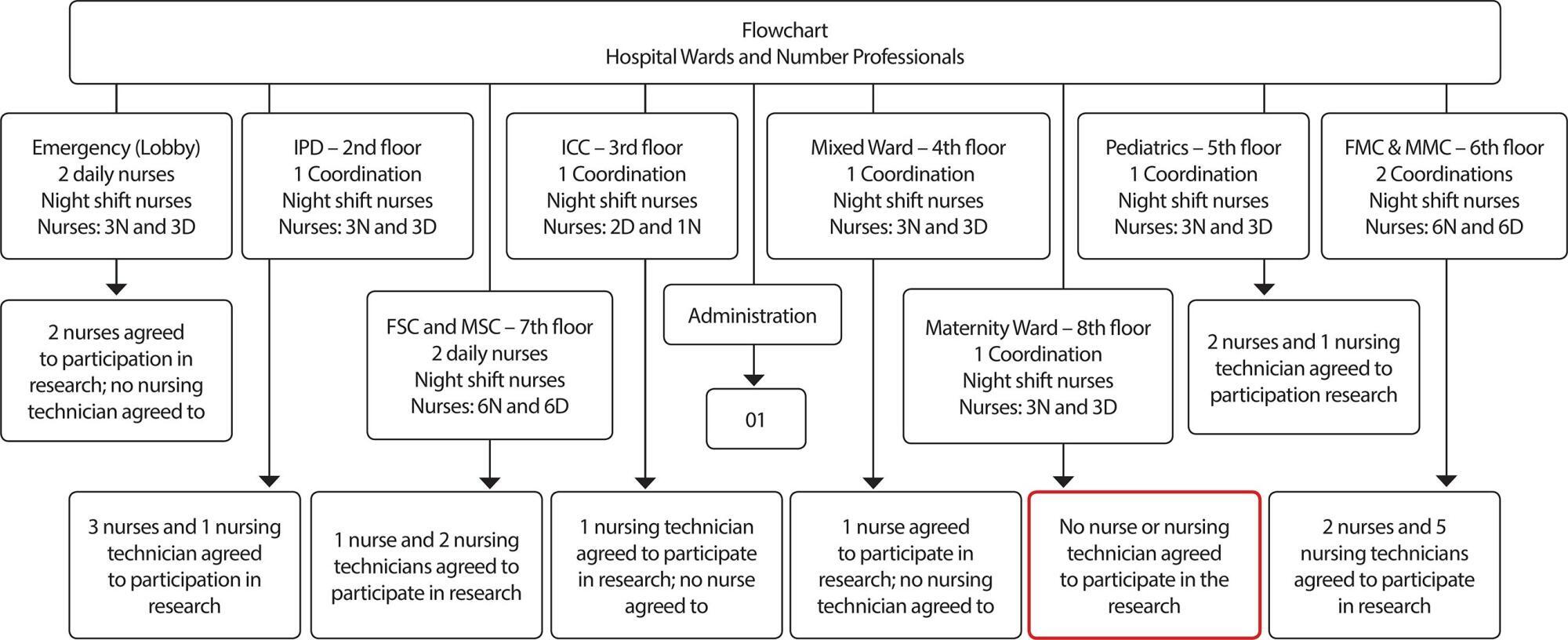
-
ORIGINAL ARTICLE05-28-2021
Nurses’ educational practices in Family Health Strategy
Revista Brasileira de Enfermagem. 2021;74(2):e20200045
Abstract
ORIGINAL ARTICLENurses’ educational practices in Family Health Strategy
Revista Brasileira de Enfermagem. 2021;74(2):e20200045
DOI 10.1590/0034-7167-2020-0045
Views0See moreABSTRACT
Objectives:
to analyze the nurse’s educational practice in Family Health Strategy.
Methods:
descriptive study with a qualitative approach, whose data production used the World Café group technique, in two meetings, with 26 nurses of a health district of Manaus-AM. The technique used was Categorial-Thematic Content Analysis.
Results:
the study generated two units of analysis: Political and Organizational Configuration of Educational Work at ESF and Operational Configuration of Educational Work at ESF, revealing the necessary (re)configurations in co-management, in the centrality of the subject for the planning of educational work, and in (re)pactuation between the management of services and training institutions to overcome contradictions in the implementation of National Policies on Permanent Education and Basic Health Care.
Conclusions:
the configuration of nurses’ educational practice at ESF works toward interactions, organized to respond to health policies, incorporating creativity in doing, but facing numerous obstacles.
-
ORIGINAL ARTICLE09-21-2020
Adaptive problems arising out of the progenitor’s abandonment after Zika Congenital Syndrome
Revista Brasileira de Enfermagem. 2020;73:e20190602
Abstract
ORIGINAL ARTICLEAdaptive problems arising out of the progenitor’s abandonment after Zika Congenital Syndrome
Revista Brasileira de Enfermagem. 2020;73:e20190602
DOI 10.1590/0034-7167-2019-0602
Views0See moreABSTRACT
Objective:
to reveal the adaptive problems of the woman abandoned by the child’s parent after Congenital Zika Syndrome, in the light of Roy’s Adaptation Model.
Method:
a qualitative, descriptive study, based on Roy’s Adaptation Model, developed with six women abandoned by their child’s parent after Zika Congenital Syndrome diagnosis, through interview and Content Analysis technique.
Results:
adaptive problems appeared in nutrition, activity, rest, and protection patterns, due to limitations in self-care; self-concept, related to dissatisfaction with body image and personal being; in the role of transition role, through difficulties in taking over new roles and in interdependence, related to changes in affective needs.
Final considerations:
the overload of care for children with Congenital Zika Syndrome, added to the challenges of the abandoned woman by her child’s parent, led to adaptive problems, showing their main difficulties of coping.
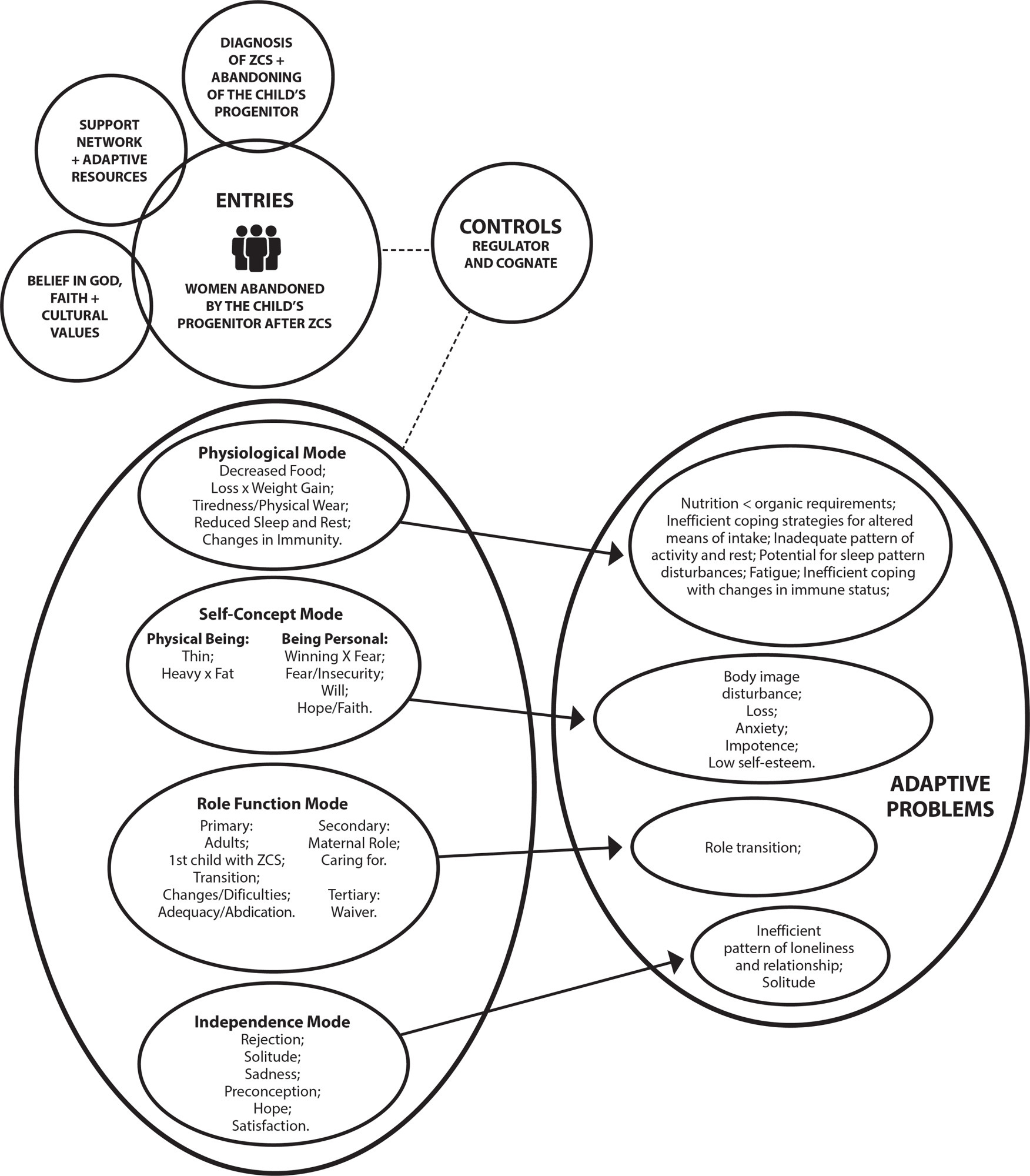
-
REVIEW07-14-2021
Stress level experienced by participants in realistic simulation: a systematic review
Revista Brasileira de Enfermagem. 2021;74(4):e20201151
Abstract
REVIEWStress level experienced by participants in realistic simulation: a systematic review
Revista Brasileira de Enfermagem. 2021;74(4):e20201151
DOI 10.1590/0034-7167-2020-1151
Views0See moreABSTRACT
Objectives:
to identify the available evidence regarding stress levels experienced by participants in education based on a realistic simulation.
Methods:
systematic review that included randomized clinic trials on electronic databases: Cumulative Index to Nursing and Allied Health Literature, Cochrane Library, Latin-American and Caribbean Literature in Health Sciences, LIVIVO, PubMed, Scopus, and Web of Science. The additional search was performed on Google Scholar and OpenGrey. All searches occurred on September 24, 2020. The methodologic quality of the results was evaluated by the Cochrane Collaboration Risk of Bias Tool.
Results:
eighteen studies were included, which evaluated the participants’ stress using physiologic, self-reported measures, or the combination of both. Stress as experienced in a high level in simulated scenarios.
Conclusions:
evidence of the study included in this systematic review suggest that stress is experienced in a high level in simulated scenarios.

-
ORIGINAL ARTICLE10-19-2020
Spatial patterns of multidrug-resistant tuberculosis: correlation with sociodemographic variables and type of notification
Revista Brasileira de Enfermagem. 2020;73:e20190845
Abstract
ORIGINAL ARTICLESpatial patterns of multidrug-resistant tuberculosis: correlation with sociodemographic variables and type of notification
Revista Brasileira de Enfermagem. 2020;73:e20190845
DOI 10.1590/0034-7167-2019-0845
Views1See moreABSTRACT
Objective:
Correlate the cases of multidrug-resistant tuberculosis and its spatial patterns with the type of notification and sociodemographic variables.
Method:
Ecological study carried out in the municipality of Belém, with 77 cases of multidrug-resistant tuberculosis registered in the Special Treatment Information System for Tuberculosis, between 2012 and 2016. For analysis, the data was debugged followed by geo-referencing in ArcGis 10.3 and Terra View 4.2.2. To relate the cases with the type of notification, the BioEstat 5.4 software was used, with a significance level of 95%.
Results:
Of the total, 40 (52%) were new cases; 27 (35%), relapses; and ten (13%) were re-enrolled after leaving. Multidrug-resistant tuberculosis was randomly distributed and related to income, household, territorial cluster and water supply. There was a concentration of cases in two administrative districts, corresponding to 28.5% and 27.3% of the total, with a median Sociodemographic Index.
Conclusion:
Behavior of multidrug-resistant tuberculosis influenced by sociodemographic indicators.
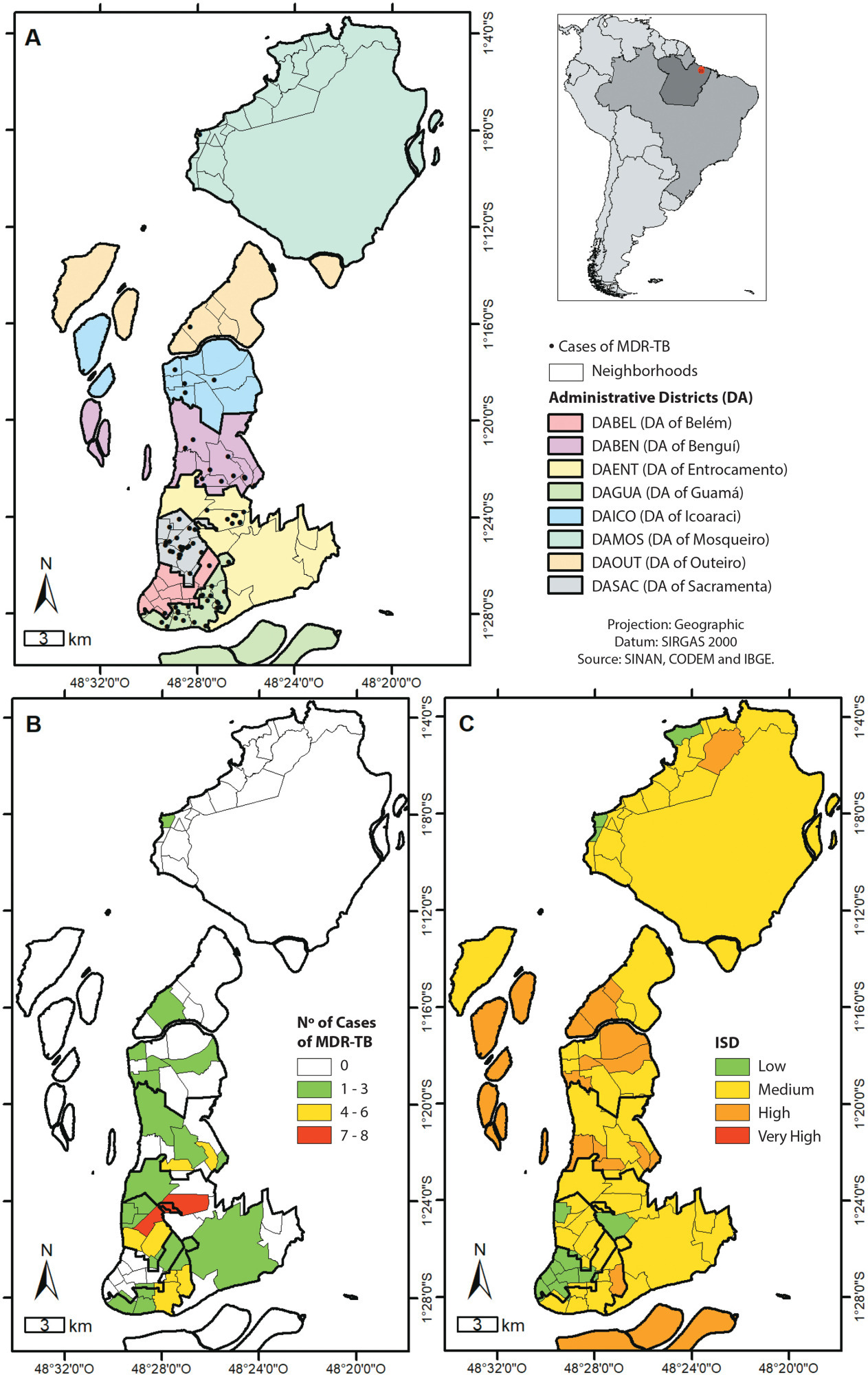
-
ORIGINAL ARTICLE10-19-2020
Problematization educational intervention to promote healthy habits in elderly people with diabetes: randomized clinical trial
Revista Brasileira de Enfermagem. 2020;73:e20190719
Abstract
ORIGINAL ARTICLEProblematization educational intervention to promote healthy habits in elderly people with diabetes: randomized clinical trial
Revista Brasileira de Enfermagem. 2020;73:e20190719
DOI 10.1590/0034-7167-2019-0719
Views0See moreABSTRACT
Objective:
to assess the effects of a problematization educational intervention to promote healthy habits in elderly people with diabetes.
Methods:
a randomized clinical trial conducted with 202 individuals drawn for the intervention group and the control group. The intervention consisted of problematization educational activities on a monthly basis for over six months. The control group participated in conventional monitoring at the health unit. Data were collected through semi-structured interviews before and after the intervention, in addition to laboratory tests.
Results:
after the intervention, when compared to the control group, there was an increase in knowledge about the disease (p<0.001), positive attitude towards self-care (p=0.011), physical activity (p=0.020), diet variety (p=0.002), and lower consumption of oils and fats (p<0.05).
Conclusion:
the intervention performed has a beneficial effect to promote healthy habits.
-
ORIGINAL ARTICLE09-21-2020
Nurses’ attitudes facing the family involvment in caring for people with mental disorder
Revista Brasileira de Enfermagem. 2020;73:e20200041
Abstract
ORIGINAL ARTICLENurses’ attitudes facing the family involvment in caring for people with mental disorder
Revista Brasileira de Enfermagem. 2020;73:e20200041
DOI 10.1590/0034-7167-2020-0041
Views0See moreABSTRACT
Objective:
To characterize the attitudes of Primary Health Care nurses, regarding the involvement of the family in the care for people with Mental Disorder.
Methods:
Correlational study with 257 nurses from the city of São Paulo. The scale “Importance of Families in Nursing Care- Nurses’ Attitudes” was used. For the analysis, descriptive and inferential statistics were used.
Results:
The scale scores were high, with a mean value of 82.1 (SD=8.4) favorable to the families’ involvement, and are related to being a nurse in the Family Health Strategy (p<0.001), having received education/training in family nursing (p<0.005), the workload of 40 hours/week (p<0.005), working in the West, East and Center Regions (p<0.005).
Conclusion:
Most nurses have positive attitudes towards the involvement of families, a relevant indicator for their inclusion in the health-mental care process.
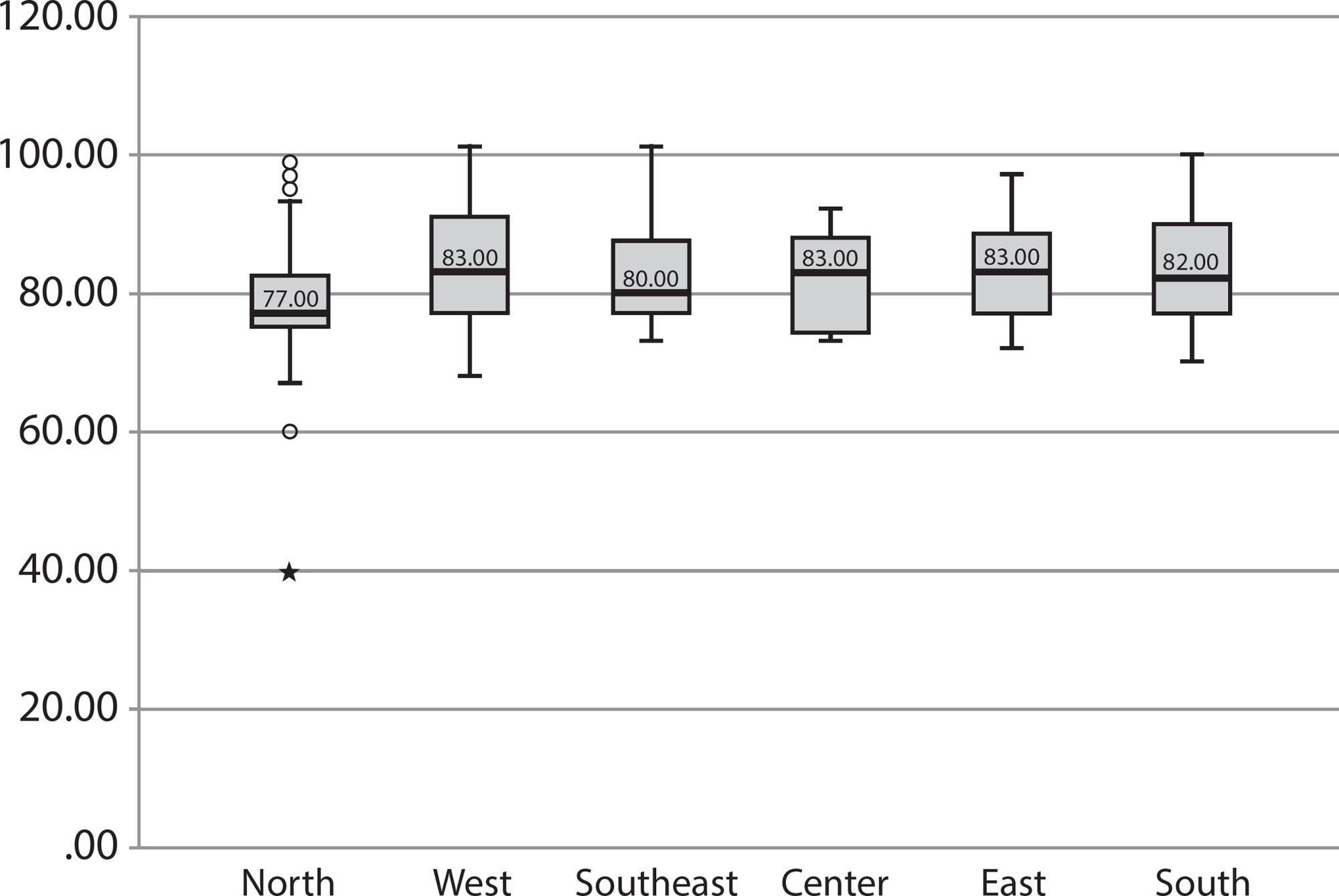
-
08-30-2021
Products and technologies for treating patients with evidence-based pressure ulcers
Revista Brasileira de Enfermagem. 2021;74(5):e20180686
Abstract
Products and technologies for treating patients with evidence-based pressure ulcers
Revista Brasileira de Enfermagem. 2021;74(5):e20180686
DOI 10.1590/0034-7167-2018-0686
Views0See moreABSTRACT
Objective:
to identify products/technologies for treating patients with pressure ulcers with an evidence level 1.
Method:
this is an integrative literature review. A survey of studies was carried out using the United States National Library of Medicine Portal, Scientific Electronic Library Online, Virtual Health Library, National Library of Medicine(®), The Cumulative Index to Nursing and Allied Health Literature, Latin American and Caribbean in Health Sciences, Nursing Database.
Results:
sixteen articles were selected with level of evidence 1. The findings were categorized into five categories: Topical therapy to promote healing; Alternative therapy to promote healing; Topical therapy to promote debridement; Topical therapy to minimize lesion contamination; Topical therapy to reduce lesion size.
Final considerations:
the 17 products/technologies identified favor/fast healing, debridement, minimize contamination and reduce lesion size to accelerate healing.
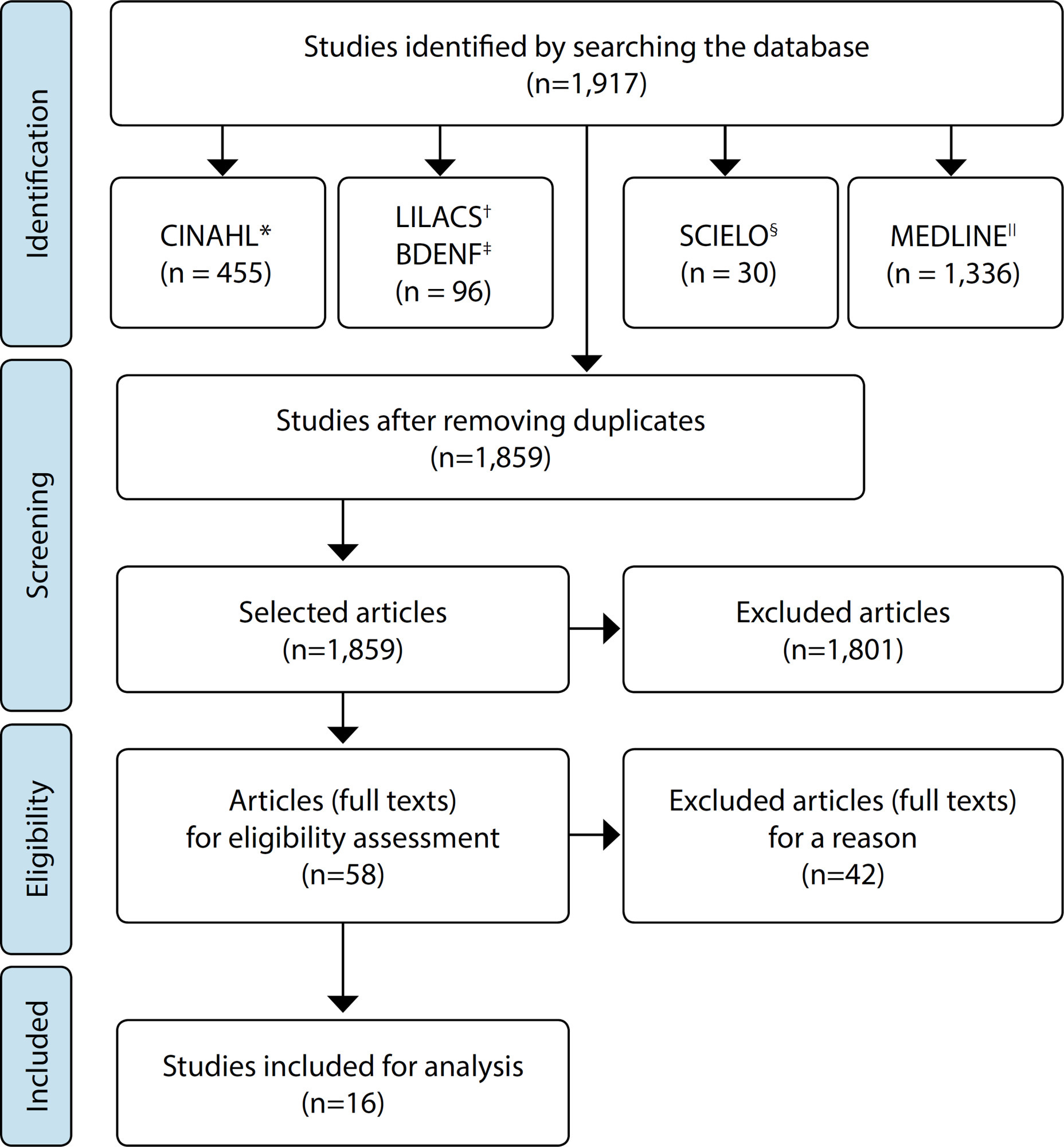
-
ORIGINAL ARTICLE10-23-2020
Active ageing among elderly community members: structural equation modeling analysis
Revista Brasileira de Enfermagem. 2020;73:e20200110
Abstract
ORIGINAL ARTICLEActive ageing among elderly community members: structural equation modeling analysis
Revista Brasileira de Enfermagem. 2020;73:e20200110
DOI 10.1590/0034-7167-2020-0110
Views0See moreABSTRACT
Objective:
to propose a structural model of active ageing among elderly community members based on the World Health Organization’s theoretical framework and to identify the most relevant determinants of active ageing to the proposed model.
Methods:
a cross-sectional and analytical study conducted with 957 elderly community members. Confirmatory factor analysis and structural equation modeling were performed.
Results:
the final measurement model was composed of the six determinants of active ageing: behavioral (R²=0.66); personal (R²=0.74); physical environment (R²=0.70); social (R²=0.77); economic (R²=0.44); and social and health services (R²=0.95). The last one showed good quality of adjustment: χ2/gl=3.50; GFI=0.94; CFI=0.92; TLI=0.90; RMSEA=0.05. By analyzing the trajectories between determinants and active ageing, the most representative was social and health services active ageing (λ=0.97; p<0.001).
Conclusion:
satisfaction with access to health services and positive self-assessment of health status were the factors that most contributed to active ageing in this population.
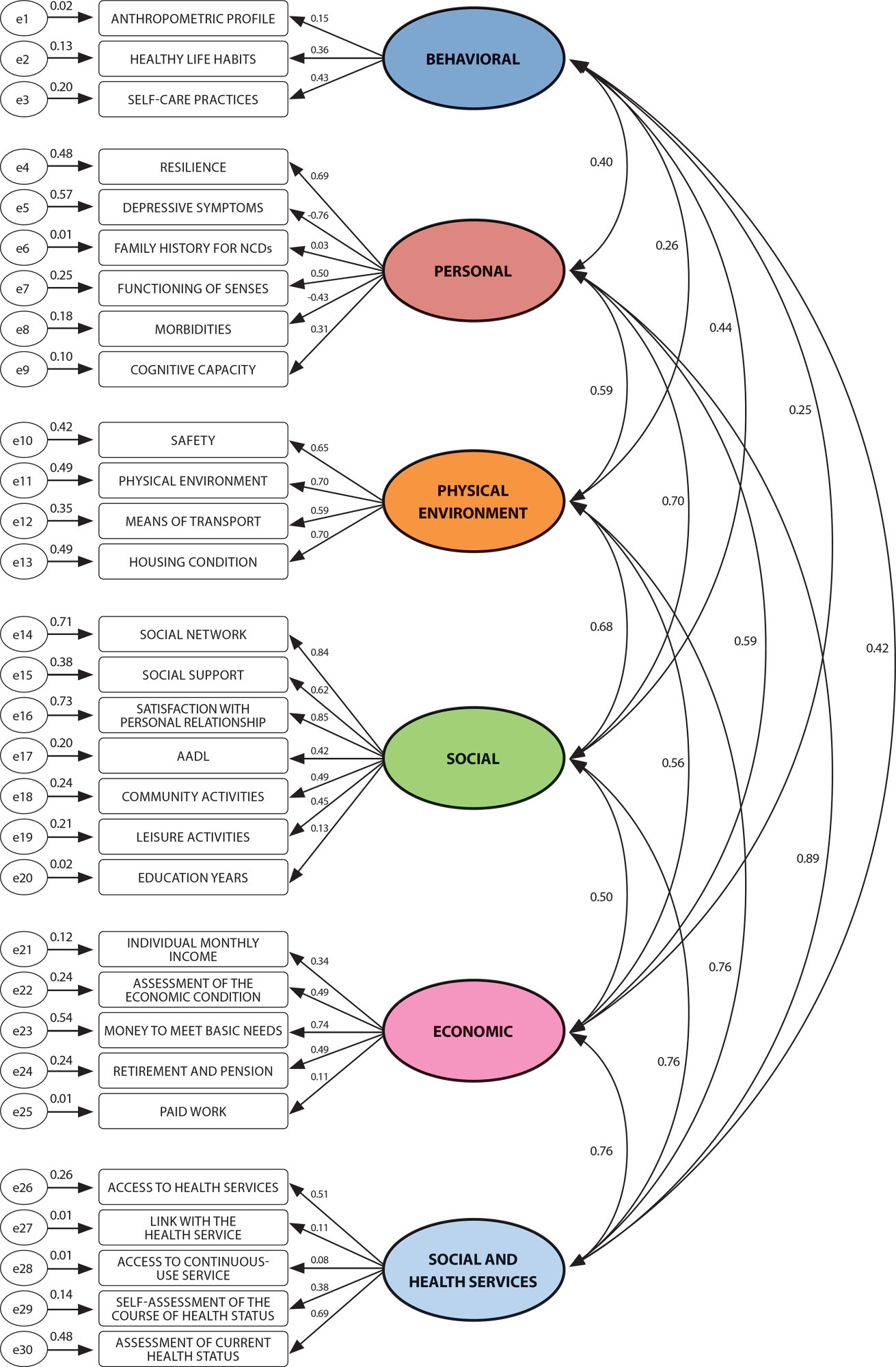
Search
Search in:
Nuvem de Tags
Adolescente (85) Atenção Primária à Saúde (239) COVID-19 (91) Criança (91) Cuidados de Enfermagem (269) Educação em Enfermagem (151) Educação em Saúde (139) Enfermagem (930) Enfermagem Pediátrica (86) Estudantes de Enfermagem (77) Estudos de Validação (131) Família (87) Idoso (208) Promoção da Saúde (99) Qualidade de Vida (104) Saúde do Trabalhador (86) Saúde Mental (145) Saúde Pública (82) Segurança do Paciente (150) Tecnologia Educacional (100)



